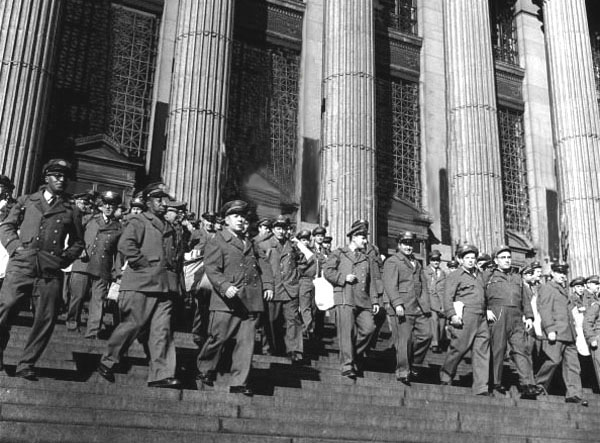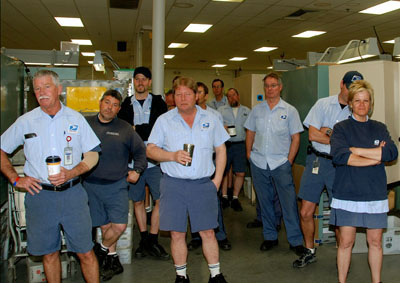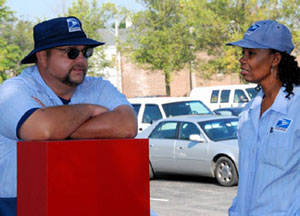Cultural Clash in Pictures
 |
 |
 |
 |
 |
 |
 |
Mailmen vs. Mail Carriers

caption
Their quasi-military uniform is dignified without pretending to be fancy: Each mailman wears either a double-breasted coat or a pilot-jacket, comfortable gabardine pants with a dark narrow stripe down each side, a clean white shirt and a tie, and a visor cap with a USPS badge. Polished dark shoes complete their professional appearance. On his shoulder each carries a mailbag with letters and small packages.
A closer look at the picture shows you that these postal workers are Americans of different color and ethnic origin, effectively representing the population of the New York City they serve.
The group is framed by the monumental Roman style building of the New York Post Office. The ensemble reflects the seriousness and vitality of the employees of an institution that is convinced of the importance of its work for society.

Mail carriers casual style
At left you see some postal employees in a relaxed pose, perhaps during a break, in a typical post office in 2010.
The uniform requirements of the mail carriers have obviously changed. Men are free to use long pants or Bermudas; women can wear mini-skirts, Bermudas or pants. The short-sleeved shirt can be worn tucked in or out. The undershirts that appear with the open collar can be any color. Of course, the tie was abandoned, as well as the suit jacket or coat. The pullovers or sweatshirts are dark blue, but not uniform in appearance.
The shoes are similarly varied; in the picture we can distinguish black sports shoes, light work boots and regular shoes, worn with or without socks, again, any color of choice. The only restriction is that �bright florescent hose and socks are not permitted,� the regulation booklet stipulates.

mail carriers casual hats
The stability and seriousness of the past has been replaced by a pseudo-juvenile and precarious spirit. Replacing the air of commitment and efficiency is one of sloppy and lackadaisical ineffectiveness. The mentality of the profession has clearly changed. Before mailmen were committed to serve society; now they seem to be turned almost exclusively toward their own comfort, rights and salaries.
The general impression is of disorder, lack of discipline and egalitarianism. The ridiculous is not absent from the picture when one considers men who look more like boys in shorts rather than a professional cadre of trained workers. Immorality and the grotesque respectively appear when the carriers � male and female - show their legs.
What a remarkable change in 50 years! And it is not found just in the post office. Today you can find this transformation toward vulgarity and egalitarianism in every sphere of life, in every profession � high or low, religious or secular.
This contrast of pictures shows us the gradual march of the Revolution. In 50 years everything became more akin to it.
- Footnote 1
- Footnote 2
- Footnote 3
- Footnote 4
Posted October 8, 2013
______________________
______________________








